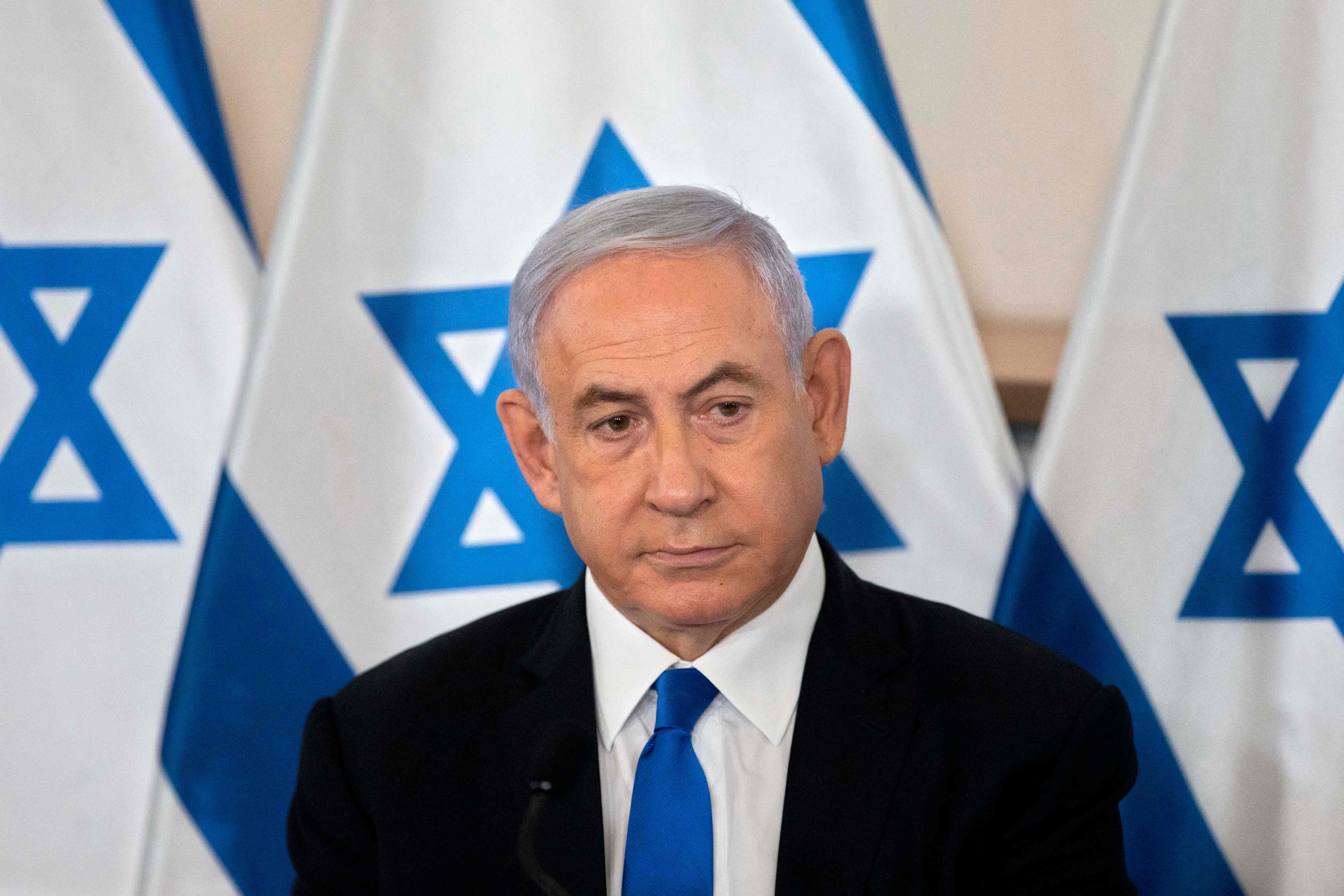Netanyahu hits back at deal by ‘dangerous left-wing government’ to unseat him
‘All legislators elected by votes from the right must oppose this dangerous left-wing government,” Mr Netanyahu said on Twitter

Your support helps us to tell the story
This election is still a dead heat, according to most polls. In a fight with such wafer-thin margins, we need reporters on the ground talking to the people Trump and Harris are courting. Your support allows us to keep sending journalists to the story.
The Independent is trusted by 27 million Americans from across the entire political spectrum every month. Unlike many other quality news outlets, we choose not to lock you out of our reporting and analysis with paywalls. But quality journalism must still be paid for.
Help us keep bring these critical stories to light. Your support makes all the difference.
Israeli Prime Minister Benjamin Netanyahu on Thursday fought back against an agreement by his political opponents for a coalition government aimed at unseating him.
Mr Netanyahu, facing the very real prospect of an end to his 12 year run as premier, said on Twitter “all legislators elected by votes from the right must oppose this dangerous left-wing government”.
It was the first public pushback by Mr Netanyahu, who heads the right-wing Likud party, against centrist politician Yair Lapid’s announcement about 35 minutes before a Wednesday night deadline that he had succeeded in forming a governing coalition.
Under the deal, nationalist Naftali Bennett, 49, a former defence minister and a high-tech millionaire, would become prime minister and hand over the post to Mr Lapid, 57, a former TV host and finance minister, in about two years.
The agreement capped a 23 March election in which neither Likud nor its allies nor their opponents won a majority in the legislature. It was Israel’s fourth national ballot in two years.
The coalition comprises a patchwork of small and medium parties from across the political spectrum, including for the first time in Israel’s history one that represents its 21 per cent Arab minority - the United Arab List.
They have little in common other than a desire to oust Mr Netanyahu, whose is also on trial on corruption charges. He denies any wrongdoing.
The lineup includes Mr Bennett’s Yamina (Rightward), centre-left Blue and White, headed by Defence Minister Benny Gantz, the left-wing Meretz and Labour parties, former defence minister Avigdor Lieberman’s nationalist Yisrael Beitenu party and New Hope, a right-wing party headed by former education minister Gideon Saar, who broke away from Likud.
Political analysts have widely expected Mr Netanyahu to try to pick off what one described as “low-hanging fruit”, seizing upon Yamina members who are unhappy about joining forces with Arab and leftist lawmakers.
Tamar Zandberg, a Meretz legislator, acknowledged the difficulties in getting the alliance that her party joined off the ground.
“The coalition’s test...is to be sworn in - that won’t be without rough patches and problems,” she said on Army Radio on Thursday.
Mr Netanyahu controls 30 seats in the 120-member Knesset, almost twice as many as Lapid’s Yesh Atid party, and he is allied with at least three other religious and nationalist parties.
A source involved in the coalition talks said the proposed new government would try to retain consensus by avoiding hot-button ideological issues such as whether to annex or cede occupied West Bank territory that Palestinians want for a state.
Mr Bennett has said that the creation of an independent Palestine would be suicide for Israel. He made annexation of parts of territory that Israel captured in the 1967 Middle East war a major feature of his political platform but following through on that with the broad new coalition looked to be politically unfeasible.
But any new flareup along Israel’s volatile border with Gaza, nearly two weeks after a ceasefire ended 11 days of fighting with the Palestinian enclave’s ruling Hamas group, could challenge the stability of the broad alliance.
During his tenure as prime minister, Mr Netanyahu has been an often polarising figure at home and abroad.
He has said a Bennett-Lapid coalition would endanger Israel’s security - an allusion to efforts to curb Iran’s nuclear programme and managing the Palestinian issue.
Mr Lapid, a centrist who campaigned under a pledge to “return sanity” to Israel, was given the task of forming a government after Mr Netanyahu failed to do so in the wake of the March election.
Mr Netanyahu’s rivals have cited the criminal charges against him as a main reason why Israel needs a new leader, arguing that he might use a new term to legislate immunity to shield himself.
“This government... will respect its opponents and do all it can to unites and connect all parts of Israeli society,” Mr Lapid said on Twitter.
The new government, if it is sworn in, will face considerable challenges. As well as Iran and the moribund peace process with the Palestinians, it also faces a war crimes probe by the International Criminal Court and economic recovery following the coronavirus pandemic.
Mr Bennett has said its members would have to compromise on such ideological issues in order to get the country back on track, with government debt at 72.4 per cent in 2020, up from 60 per cent in 2019 and the deficit jumping to 11.6 per cent in 2020 from 3.7 per cent in 2019.
Reuters
Subscribe to Independent Premium to bookmark this article
Want to bookmark your favourite articles and stories to read or reference later? Start your Independent Premium subscription today.
Join our commenting forum
Join thought-provoking conversations, follow other Independent readers and see their replies
Comments